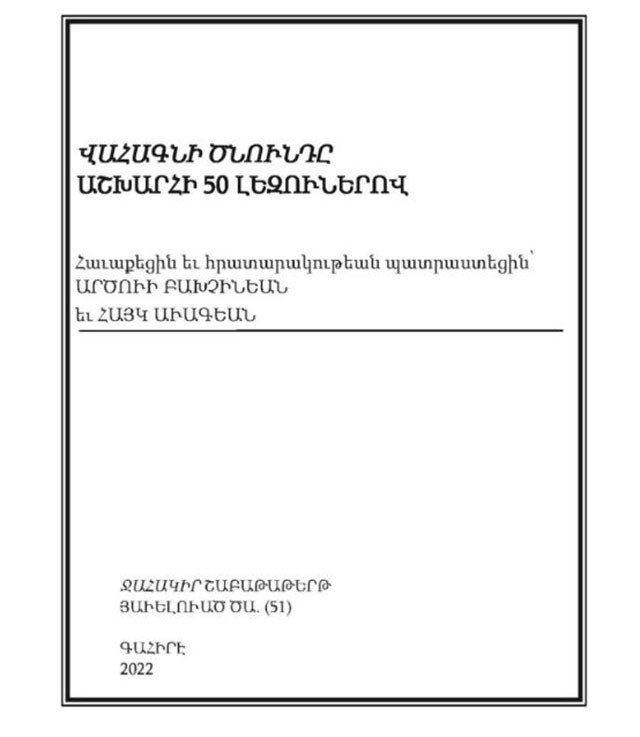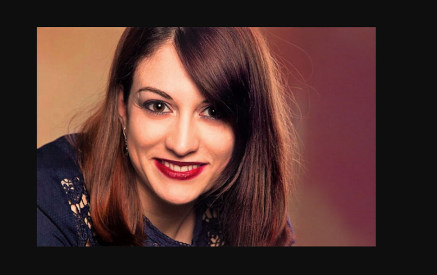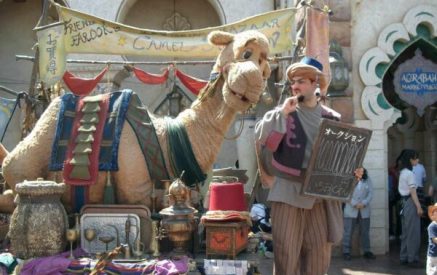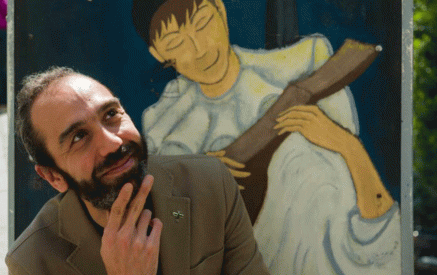by The Armenian Mirror-Spectator
On November 19, the presentation of a new book, ‘The Birth of Vahagn’ in 50 Languages,” compiled by Artsvi Bakhchinyan and Haig Avakian, took place at Bulukdanian Hall in Cairo, in the presence of the compilers. This is the 51st volume of Cairo’s Tchahagir Armenian-language weekly’s supplements, launched in 2016.
The most ancient extant Armenian song, known as “The Birth of Vahagn” and preserved due Movses Khorenatsi’s work The History of Armenia, is one of most beloved and popular examples of Armenian literature. An expression of the singing tradition of Goghtan province (currently in Nakhichevan, Azerbaijan), it depicts the birth of Vahagn, the deity of fire, thunder, and war worshiped in ancient Armenia. The literary original reached us without music.
“The Birth of Vahagn” is also one of the most frequently translated Armenian poems. For the first time we find it translated into the Latin language in 1736, published in London as a part of Movses Khorenatsi’s work prepared by the Whiston brothers.
Read also
Cairo musicologist and philologist Haig Avakian came up with the idea to collect all published translations of “The Birth of Vahagn” in a volume, as one of his numerous and varied literary projects. He is the main author or editor of various collections of materials published as the aforementioned supplements to Tchahagir. He collected all available hitherto published translations in 20 languages (Arabic, Bulgarian, Czech, English, Farsi, French, Georgian, German, Greek, Hungarian, Italian, Latin, Romanian, Russian, Serbian, Spanish and Turkish). Later his friend and colleague from Armenia, philologist Artsvi Bakhchinyan – author of number of studies in history and culture, with some experience in multilingual publications – joined him providing three other published translations (Polish, Portuguese, and Swedish) and arranging new ones in 27 more languages, using his global network of friends and friends of friends.
There is a certain tradition of multilingual publications among Armenians. Already in 1810, the Mkhitarists of Venice published the 12th century poet Nerses Shnorhali’s “In Faith I Confess” prayer in six languages. They then multiplied the number of languages which by 1871 reached 36. In 1986 in Yerevan the poem of the seventh century poet Davtak Kertogh was published in seven languages. On Artsvi Bakhchinyan’s initiative, Armenian writer Elda Grin’s short story “Hands” was published in 35 languages (2010) and English-language poet Hovhanness Pilikian’s poem “The Sea Scene on My Mother’s Day” in 19 languages (2012). In 2019, Yeghishe Charents’s famous poem, “I Love My Sweet Armenia’s Word” was published in 35 languages.
“The Birth of Vahagn” in 50 Languages includes not only translations, but also versions in Eastern and Western Armenian. With this edition, Armenian poetry has been translated into some languages for the first time, especially in the languages of the Far East (Thai, Laotian, Khmer), as well as in an African language (Lingala, the language of Congo).
The compilers of the volume are grateful to the people who willingly agreed to be part of the project. Among them are poets like Emil Asdurian (Albanian, USA); specialists involved in Armenian studies Andrea Scala (Romani, Italy), Shlomi Efrati (Hebrew, Israel), Bayarsaikhan Dashdondog (Mongolian, Mongolia); philologists Siarhey Nikitko (Byelorussian, Byelorussia), Armine Piloyan Vrteska (Macedonian, North Macedonia) and Mery Sarkisian (Slovakian, Austria). Among the translators there are also people from various professions with Armenian interests like Gerda Davidian (Danish, Denmark), Ingibjorg Þorisdottir (Icelandic, Iceland) and singer Sini Tuomisalo (Finnish, Finland) or of Armenian origin, such as sculptor Arsen Kljan (Estonia, Estonian), musicians Andi Roselund and Nakyung Kim (Korean, South Korea), boxing coach Garro Nanikian (Lingala, Congo) and artist Karen Nikgol (Norwegian, Norway).
Some non-Armenian specialists and native speakers participated by invitation of mutual friends like Andrea Lafuentek (Basque, Spain), poet Ahmed Swapan Mahmud (Bengali, Bangladesh), Dr. Vinodkumar (Hindi, India), Nuraysha Bekeeva (Kazakh, Kazakhstan) Natalia Spatar (Khmer, Russia), Welat Alp (Kurdish, France), Soutchai Khamphouxai (Laotian, Laos), Dr. Navamintr (Tom) Vitayakul (Thai, Thailand), Nigora Umarova (Uzbek, Uzbekistan) and Natalia Sandetska (Ukrainian, Ukraine). Four translators from Armenia also took part in the project – native speakers Tahmina Tumasova of Assyrian, Nane Djerrahian of Dutch, and Olga Arzumanian of Lithuanian, as well as specialists of languages David Gritsenko of Chinese and Ruzan Khojikyan of Japanese.
The compilers of the volume address their special thanks to the following people and experts who, responding to their requests, provided the volume with new materials, or were mediators with the aforementioned translations: Victoria Minoian (Argentina) for Laotian, historian Mihran Minasyan (Armenia) for providing various information and checking, Anahit Khosroeva (Armenia-USA) for Assyrian, Felix Bakhchinyan (Armenia) for Lithuanian, Golam Rabbany Biplob (Bangladesh) for Bengal, Dr. Deize Crispim Pereira (Brazil) for Portuguese, Haig Utidjian, Milada Kilianova and Hakob Asatryan (Czech Republic) for Czech, Hovik Kassapian (Greece) for Greek, Bijaya Jena (India) for Hindi, Michael Stone (Israel) for Hebrew, Gulnara Mendikulova (Kazakhstan) for Kazakh, Valda Salmiņa for Latvian (Latvia), Anush Balayan (Serbia) for Serbian, Ivan Gaztanaga (Spain-USA) for Basque, Laura Daun Minasjan (Sweden) for Khmer, Lousia Adamian (Sweden) for Swedish, Elizabeth Romhild (Thailand) for Thai, Maral Aktokmakyan (Turkey) for Turkish, Umit Kurt (Turkey-Israel) for Kurdish, Viktor Solovka (Ukraine) for Ukrainian and Georgi Saakov (Uzbekistan) for Uzbek.
Without the loving support of all these people the present work would not have been possible. One can call this initiative a project of friendship, with different nationalities and specialists unified under the same umbrella for cultural reasons.
The book is published in a limited edition. It is not for sale or any commercial use. The Internet version is available here:




























































